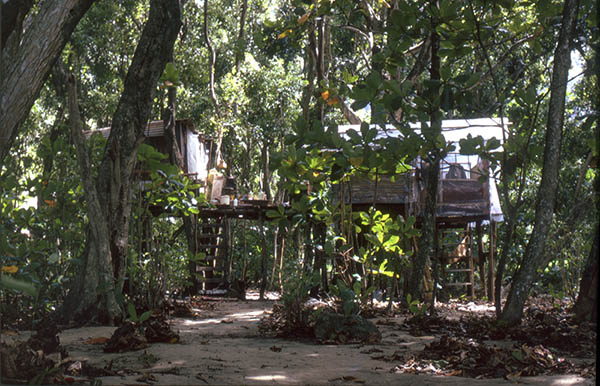 |
 |
 |
 |
||||||
|
|
|
|
|
|
|
|
|
|
 |
 |
||
 |
|
|
 |
 |
 |
 |
 |
|||
 |
“According to word of mouth sources, Elizabeth Taylor’s brother bought a piece of land here in what is now Hā‘ena State Park,” Carlos explains. “He owned it and wanted to build a house there. And the story is, he went to the county asked the county if he could get a building permit, and was told ‘No you can’t get a building permit, because that’s going to become a state park in the future.’ So the park was in the pipeline but all the arrangements hadn’t been completed yet. He said ‘Well, stop taxing me the county real property tax if I am not going to able to build.’ They said ‘No, we cannot stop taxing you.’ This was a time when young people were coming around and camping on his land. He just told somebody—I don’t know who—If you want to go camp, go camp on my land down there—and tell all your friends.’" 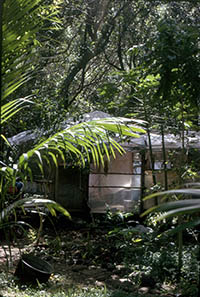
“I had some good friends who lived there,” Samson says. “Yes, when I had to take cattle to the slaughterhouse, I needed some help, well, I picked them up on the road. I wanted to take branches and plant plumeria trees because the kids had a money-making project making plumeria leis for Club Med. Club Med was one big buyer there, Mondays and Fridays. And then when Princeville started, they wanted—I forget who wanted 1,000 leis, and another party wanted 900 leis. So they asked me. I say, ‘Oh, we can make them.’ “One area of Nawiliwili valley, up that valley, there’s old Hawaiians live there. Big trees! So I cut them however big the branch that I can carry it. My horse trailer was fourteen feet and I made them like one stagecoach. I put brackets so I could cover that top. So I took that, get that thing over, because all the branches, I invert them so I don’t break nothing. Break them like that, if you lean on up, so I tied them all up and just hang the branches down.” “So every time I see them I say, ‘I tell you what, I gotta let you guys know what I get to do, but I’m going home that way, if that’s okay with you guys. I got to get one plumeria plantation finished.’ “On the left side of Hanalei River from the lookout, way in the back above the farmers, I leased that for pasture. So when the steers are ready for sell, I got to bring them in. So I picked the guys up—they’re free, or if I see them, I give them a ride, but I’m going to need help for that day. So I always had the help. It was easy with one or two guys, that’s plenty. I just needed a guy for that was someplace where cows look at you, they go the other way. Just put them in places. Easy job for them. But I need them, otherwise the cows will go in the bushes over there. 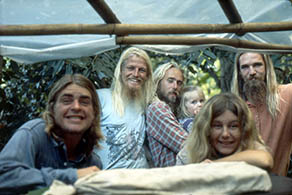
“Then when these guys see me, they know they can always get a ride. But it’s free, man, I needed the help, you know, just for the cattle. Easy kine stuff. So I picked them up because I don’t know what kine skill they had. Maybe I can use them. There’s one thing when I pick up people: I want to know what kine skill they got, I just want to know. Maybe we can make a deal, and the next time I pick you up, ‘Oh, can you do this and that.’ Just in case. I’m not going to take advantage of them, but when you need help you need help, and that’s the way I look at them.” “My grandfather wanted to plant all this place,” Uncle Tom gestures at the State Park and lo‘i area. “But the reason why now is because of the hippies, that’s why they were forced to sell to the State. The State would buy all this up to the river. 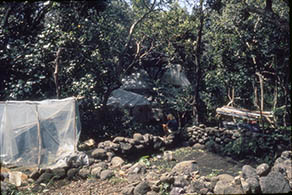
“To the left of that wall,” Kelii points to the Hanalei side of the lo‘i area, “all come towards makai, all through the plum trees. And that’s why that section there, we cannot use that for farm kalo because that’s where they had all their old cars. There’s glass and all kinds of stuff. When we cleaned up, the State came, they told us they would send other trucks—and I get equipment you know, I get my own work. That’s why I go down to the lo‘i. Open up that place and we clean that place up. So anyway they got the trucks and went down there, load up all the old cars. The State hauled them all out for us.” “Jeff Chandler, before, he harassed the people,” Uncle Tom says. “‘This place is our place, it’s our land,’—he said that. I know for a fact that the State didn’t buy this place. Buy this place with federal funds because the State didn’t have money at the time. They bought this place because of the hippies, for chase the hippies away from here. Taylor Camp, that’s how the thing came about. Taylor let anybody come over here from the mainland. They were inside there, in front here they used to go bath in the cave, doodoo in the cave and all of that, doodoo on the forward slope by the ocean. So every time the water come up, it take them away. We never used to fish on there before because of that doodoo. In the morning you come and all you see is backsides along the shore. That’s what it was, and that’s the reason why the State bought this place.” 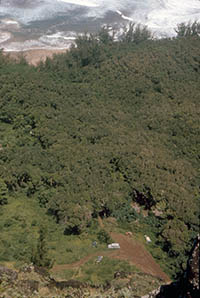
“Oh, I remember Taylor Camp,” Kelii says. “I was an ‘Indian’ when Taylor Camp was. I was young—ten or eleven. I used to chase the hippies on my horse. You know why? Because they came and they used to go all nude on the beach and so we’d go holoholo—again on the horse was our bicycle. So we go ride the beach, me and my cousin, we go ride the horse and we go down the beach. Or if we go down to the cold pond and go swim by Limahuli. So we used to ride our horse, hit the ocean, come down on the beach—right down the beach side. And then we’d come around. We used to see all the hippies out there, all nude on the beach. And my Mom told me—I don’t forget that—‘That’s BAD what they’re doing! They’re naughty people!’ “And once that was instilled in our mind, man, we used to see them on the beach. I no lie to you: full gallop, I chased them, I run them over with my horse if I have to. They seen us coming, they run! They did! I run right through their camp! And in their camp they get tree houses. I used to run right through their camp with the horse chasing whoever I was chasing. After that thing closed down, some other guys that lived there and were part of that, they remember me. And I say ‘Yeah, you remember how I used to chase you guys on a horse?’”
|
 |
||
 |
Visitors to Hā‘ena were fewer back then. The onslaught of thousands of tourists and new residents brings to light some of the many issues affecting Hā‘ena today.
|
 |
||
 |
|
 |
||

|
|
||||
| Copyright 2018 Pacific Worlds & Associates • Usage Policy • Webmaster |
||||
